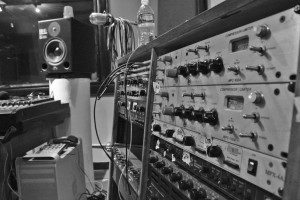
FOCUS ON JUST ONE TRACK
What if they had started by just focusing on one song? They would have picked their best song. They would have rehearsed just this one song until it shined. They would have come into the studio with just this one song on their mind and with a little luck, they would have tracked it beautifully. All the attention would be on this one song. Ideas, discussions, things to try in the mix would have all been focused on this one song. When it was finished and released, people would want to hear it again – and that’s what you want, to leave them wanting more. Have them begging for more. Have your fans focused on this one song, sharing this one song with friends. Have the venue bookers humming this one song as they book you at the club.
Okay, did it work? Did our attempt at written subliminal suggestion work? Are you thinking about going into the studio and focusing on just one song now? Something magical can happen when a group of musicians, engineers and producers focus all of their efforts on bringing one song to life. Ideas to try a subtle shaker percussion track or perhaps a third vocal harmony on just one line in the chorus, now can be tried without worrying about whether there will be time to mix half a dozen more songs today. It’s this intense focus and ability to experiment that is the strength of studio recording. The studio is THE place to try out ideas that are impossible while playing live. It is a magical canvas with an erase function.
TIPS TO REDUCE WASTED STUDIO TIME
And this is the realization that many artists come to after too many “squeezed” recording sessions. It is what you experience along the journey, not the miles traveled that counts here. So maybe by now you believe us that it’s better to focus on one song the next time you head to the studio. “But we can’t afford to spend 8 to 16 hours on one song,” we hear you say. Well here are two tricks that can help reduce your time in the studio:
Prepare, prepare and prepare some more. Focus on and rehearse that one song till it shines, till everyone knows it backwards and forwards. Record the rehearsals and make sure everyone is happy with the arrangement. Can you get to the first chorus faster? Is the first verse too long? Then type up a lead sheet for the song and bring plenty of copies to the studio. Nothing fancy, just chords and lyrics laid out by section. This allows the engineer to quickly get around the song instead of spending time hunting for where the line “she’s not coming back” is in the song. When doing overdubs, for instance, now both the talent and the engineer are on the same page when the singer says, “I’d like to fix the second line of verse two.”
Break it up. Fight the urge to stuff the whole session into one long day. Instead book (for example) a four-hour session to record the rhythm tracks and overdubs and go home with a rough mix. Then have everyone in the band take copious notes over the period of at least a week. Then meet before the next mixing session to discuss these notes with everyone. Make a Master List of what you like and don’t like about the rough mix. Be precise about what needs to be fixed: “bass flub at 1:24,” “flat note on the vocal at 2:31,” etc. For your second mixing session, don’t expect to get it 100% perfect and try not to spend too long mixing; after about four hours of hearing the same song over and over, you lose perspective. Go home with your near-perfect mix and repeat the last step of taking notes and making another Master List. Only when your head is clear can you hear the mix properly to make decisions about its quality and effectiveness.
If you still aren’t convinced that quality is more important than quantity, we challenge you to take your favorite artists’ best studio album and research how long they spent in the studio working on it before they were finished. Then go onto ReverbNation and find an artist with a six song EP that’s just so-so and send them an email asking how long they spent in the studio.
ABOUT THE AUTHORS
Zac Cataldo is a musician and owner/producer at Night Train Studios, a recording studio in Westford, MA. He is also co-owner of Black Cloud Productions, a music publishing company. Reach him at zac at nighttrainstudios.com.
Brent Godin is a bassist/guitarist and engineer/producer at Night Train Studios. He is also a talent scout at Black Cloud Productions. Reach him at brent atblackcloudproductions.com.